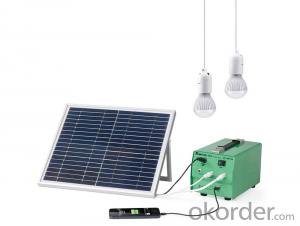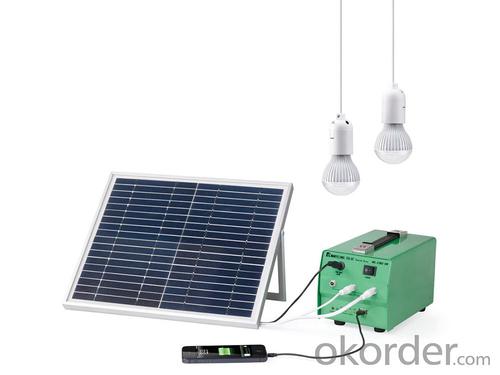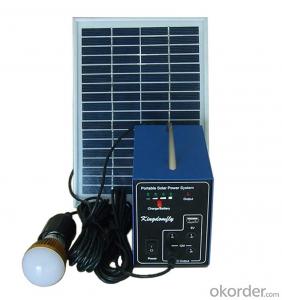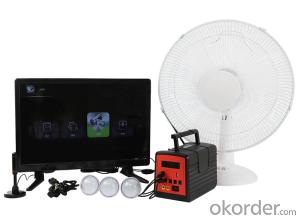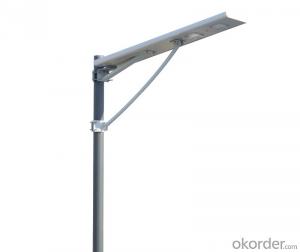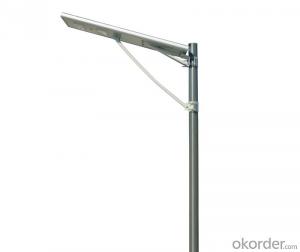Active Solar Energy Systems - 5W Solar Lighting System with Integrated Power Box
- Loading Port:
- Guangzhou
- Payment Terms:
- TT OR LC
- Min Order Qty:
- 50 set
- Supply Capability:
- 10000 set/month
OKorder Service Pledge
OKorder Financial Service
You Might Also Like
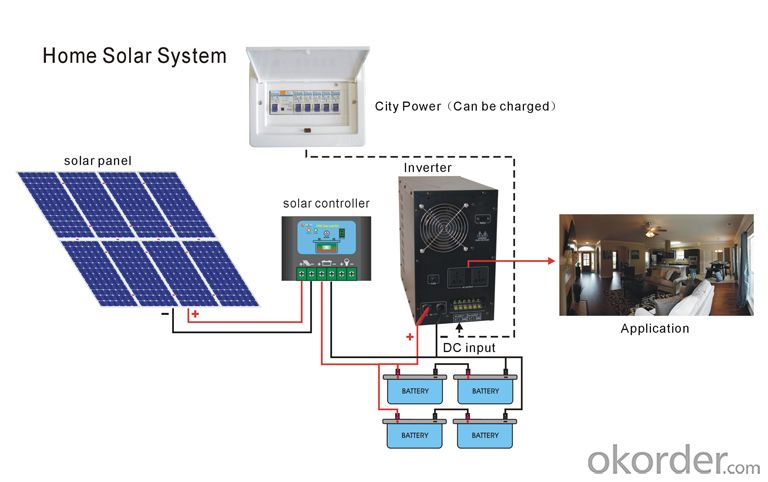
Features:
1. Solar panel : crystalline silicon 3W, efficiency>=16%;
2. Plug & Play Integrated Power Box: 1 pc (Built-in controller 3A/12V and maintenance-free lead-acid battery 4.5AH/12V),and within 1.5W led lamp ;
3. LED lamp sets: 1pcs. (1W/5V, 5m wires with on/off switch);
4. Charing cable : 1 x USB cable 10-in-1;
5. Charging time: An empty battery full charged about 6 hours under full sun. A full battery supports 2 LED lamps 8 hours;
6. Warranty: Panel 10 years; Battery 1 year; others 1 year.
| Item number | XT902-5W |
| Solar panel | Poly crystalline 5W |
| Battery | lead-acid battery 4.5AH/12V |
| LED lamp | 1.5watt, >50000 hours |
| cable of led lamp | 5 m |
| Weight | 3.5kg/set |
| Output | DC 12V and DC 5V |
| Working Time @ full battery | 2 LED lamps totally using 8hours. |
| Warranty | 1 years |
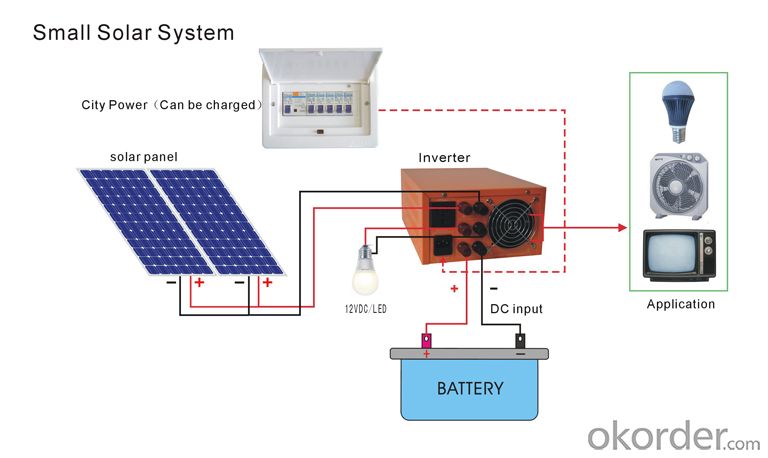
Quantuty
Quality goal:Constant innovation to meet the request of the customers. Protect the environment, provide environmental products to customer.
Quality strategy:
Quality: established high efficiency quality manager system in line with ISO9001 and ISO/TS16949.
Improvement: keeping improvement & quality guarantee.
Efficiency: delivery on time, complete the agreed events with the customers on time.
Service: focus on customers, provide the service and technology support on time.
FAQ
1. How long will my inquiry get response?
Your inquiry related to our products or prices will be replied within 24 hours.
2. Can I get professional service and suggestion?
Well-trained and experienced staffs to answer all your questions in fluent English.
3. Do you accept OEM or customized design?
OEM & ODM, any your customized lightings we can help you to design and put into product.
4. What if I need specific design?
Distributorship are offered for your unique design and some our current models.
- Q: Can solar energy systems be used in powering scientific research vessels or marine laboratories?
- Yes, solar energy systems can definitely be used to power scientific research vessels or marine laboratories. Solar energy is a renewable and sustainable source of power that can be harnessed using photovoltaic panels or solar thermal collectors. Research vessels and marine laboratories require a significant amount of energy to carry out their operations, which often includes scientific experiments, data collection, and analysis. These activities typically involve equipment such as computers, sensors, and lab instruments that require a constant and reliable source of power. Solar energy systems can be installed on these vessels or laboratories to provide a clean and efficient source of electricity. The photovoltaic panels convert sunlight into electricity, which can then be used to power the various equipment and systems onboard. Additionally, excess energy produced by the solar panels can be stored in batteries for use during periods of low sunlight or at night. Utilizing solar energy in these marine environments offers several advantages. First, it reduces the dependence on fossil fuels and minimizes the carbon footprint associated with traditional power generation methods. This is especially important in the context of scientific research, as it aligns with the principles of environmental sustainability and conservation. Second, solar energy systems provide a reliable and independent source of power. Research vessels and marine laboratories often operate in remote or isolated locations where access to traditional power grids may be limited or non-existent. By utilizing solar energy, these vessels and facilities can generate their own electricity and continue their research activities without relying on external power sources. Finally, solar energy systems are low-maintenance and have a long lifespan. Once installed, they require minimal upkeep and can withstand the harsh marine environment. This makes them well-suited for use in research vessels or marine laboratories, where downtime and maintenance issues can be disruptive to ongoing scientific projects. In conclusion, solar energy systems can certainly be used to power scientific research vessels or marine laboratories. They offer a sustainable, reliable, and independent source of electricity, reducing the carbon footprint and ensuring uninterrupted research activities even in remote locations.
- Q: Can solar energy systems be installed on rooftops?
- Yes, solar energy systems can be installed on rooftops. In fact, rooftops are one of the most common and convenient locations for installing solar panels as they receive direct sunlight and offer ample space for the panels. This placement maximizes the system's efficiency and allows homeowners and businesses to generate their own clean, renewable energy.
- Q: Can solar energy systems be used in powering dental clinics or medical clinics?
- Yes, solar energy systems can definitely be used to power dental clinics or medical clinics. Solar energy is a clean, renewable and sustainable source of power that can be harnessed through photovoltaic (PV) panels to generate electricity. These panels convert sunlight into usable energy, which can then be used to power various electrical equipment and appliances in dental or medical clinics. Dental and medical clinics typically require a significant amount of electricity to run their operations, including lighting, air conditioning, medical equipment, computers, and other electrical devices. By installing solar panels, these clinics can reduce their reliance on the traditional power grid and lower their electricity costs. Solar energy systems can be customized to meet the specific energy needs of dental or medical clinics, ensuring that they can operate smoothly and efficiently. The amount of electricity generated by solar panels can be optimized by determining the clinic's energy consumption patterns and installing an adequate number of solar panels to meet the demand. In addition to cost savings, using solar energy systems also has environmental benefits. Solar power is a clean energy source that produces no greenhouse gas emissions or air pollutants during operation. By switching to solar energy, dental and medical clinics can reduce their carbon footprint and contribute to a healthier environment. Furthermore, solar panels have a long lifespan and require minimal maintenance, making them a reliable and durable energy solution for dental and medical clinics. With proper installation and routine inspections, solar energy systems can provide a consistent and uninterrupted power supply for many years. Overall, solar energy systems are a viable and practical option for powering dental or medical clinics. They offer cost savings, environmental benefits, and a reliable source of electricity, enabling clinics to operate efficiently while reducing their impact on the environment.
- Q: Can solar energy systems be used for powering refrigeration systems?
- Solar energy systems have the capability to power refrigeration systems. Through the use of solar panels, solar energy can be converted into electricity, which can then be utilized to operate refrigeration systems. This is commonly achieved by employing photovoltaic (PV) systems, which convert sunlight into electricity using semiconducting materials. The electricity generated by these systems can be employed to power the compressors and other components of refrigeration systems, enabling them to function independently from traditional power sources. By harnessing solar energy for refrigeration, not only can energy costs be reduced, but also the environmental impact can be minimized, as solar energy is a clean and renewable power source.
- Q: What is the role of disconnect switches in a solar energy system?
- The role of disconnect switches in a solar energy system is to ensure the safety and efficient operation of the system. These switches allow for the isolation of the solar panels or inverters from the electrical grid, providing a means to disconnect the system in case of maintenance or emergency situations. They also help in preventing electrical shocks and fires by interrupting the flow of electricity and isolating different components of the system.
- Q: Can solar energy systems be used for powering electric vehicle showrooms?
- Yes, solar energy systems can certainly be used for powering electric vehicle showrooms. Solar energy is a clean and renewable source of power that can provide electricity to a wide range of applications, including commercial buildings like showrooms. By installing solar panels on the roof or surrounding areas of the showroom, the energy generated from the sun can be converted into electricity and used to power the showroom's operations, including lighting, air conditioning, charging stations, and other electrical equipment. This not only reduces the reliance on grid electricity but also helps in reducing carbon emissions and promoting sustainability. Additionally, solar energy systems can also provide a cost-effective solution in the long run, as they help in reducing or eliminating electricity bills while providing a reliable and consistent source of power.
- Q: Can solar energy systems be used for powering telecommunications networks?
- Indeed, telecommunications networks can be powered using solar energy systems. Solar power is a renewable and sustainable energy source that can be utilized to generate electricity for various purposes, including powering telecommunication infrastructure. Solar energy systems comprise solar panels that convert sunlight into electricity through the photovoltaic (PV) effect. These PV panels are commonly installed on rooftops, ground-mounted arrays, or integrated into the structure of telecommunication towers. They absorb sunlight during the day and transform it into direct current (DC) electricity. To make use of this electricity for powering telecommunications networks, an inverter is employed to convert the DC electricity into alternating current (AC), which is the standard form of electricity used in most electronic devices. The AC electricity produced by solar panels can then be utilized to power telecommunication equipment, such as base stations, antennas, transmitters, and receivers. There are numerous benefits associated with using solar energy systems to power telecommunications networks. Firstly, solar energy is abundant and accessible in almost all geographical locations, making it a feasible choice for powering remote or off-grid telecommunication sites. This reduces dependence on traditional grid electricity, which may be unavailable or unreliable in certain areas. Secondly, solar power is environmentally friendly, emitting no greenhouse gases during operation. By utilizing solar energy, telecommunication networks can significantly decrease their carbon footprint and contribute to the global shift towards clean energy sources. Furthermore, solar energy systems require low maintenance and have a long lifespan, offering a dependable and cost-effective solution for powering telecommunication infrastructure. Once installed, solar panels necessitate minimal upkeep and can last for 25-30 years or even longer with proper care. In conclusion, solar energy systems can effectively power telecommunications networks. They provide a sustainable and dependable source of electricity, reduce environmental impact, and offer a cost-effective solution for remote or off-grid telecommunication sites. With the growing emphasis on renewable energy, solar power is becoming an increasingly popular option for powering various sectors, including telecommunications.
- Q: How do solar energy systems affect the grid?
- Solar energy systems can have both positive and negative effects on the grid. On the positive side, solar energy systems can reduce the demand for electricity from traditional power plants, especially during peak hours. This can help alleviate strain on the grid and reduce the need for additional generation capacity. Additionally, solar energy systems can contribute to the decentralization of the grid. By generating electricity at the point of use, solar systems can reduce transmission and distribution losses, resulting in a more efficient energy system. This can also enhance grid resilience as power can be generated locally, reducing the vulnerability to disruptions in the transmission and distribution infrastructure. However, solar energy systems can also pose challenges to the grid. One major issue is intermittency. Solar energy generation depends on the availability of sunlight, which varies throughout the day and is absent at night. This intermittency can lead to fluctuations in grid supply, requiring grid operators to balance the system and ensure a stable supply of electricity. To address this issue, grid operators may need to invest in energy storage systems, such as batteries, to store excess solar energy during peak production and release it during periods of low production. This can help smooth out the intermittent nature of solar energy and improve grid stability. Furthermore, the integration of large-scale solar energy systems into the grid may require significant upgrades to the transmission and distribution infrastructure. These upgrades are necessary to accommodate the increased flow of electricity from distributed generation sources and ensure the reliable and safe operation of the grid. In conclusion, solar energy systems can have a positive impact on the grid by reducing demand from traditional power plants and decentralizing the energy system. However, they also pose challenges related to intermittency and the need for grid upgrades. Overall, with proper planning and investment, solar energy systems can play a crucial role in transitioning towards a more sustainable and resilient grid.
- Q: Can a solar energy system be used in areas with high levels of pollution from industrial activities?
- Yes, a solar energy system can still be used in areas with high levels of pollution from industrial activities. While pollution can potentially affect the efficiency of solar panels, it does not render them completely ineffective. Solar panels can still generate electricity even in polluted areas, although their performance may be slightly reduced. It is important to note that the extent of the impact on solar panel efficiency will depend on the specific type and concentration of pollutants present in the air. Certain pollutants, such as particulate matter or smog, can cause shading or reduce the amount of sunlight reaching the solar panels, leading to a decrease in their output. Additionally, pollutants may accumulate on the surface of the panels, resulting in lower efficiency over time. However, regular maintenance and cleaning of the solar panels can help mitigate the impact of pollution. By ensuring that the panels are kept clean and free from any debris or pollutants, their efficiency can be maintained at optimal levels. Implementing cleaning schedules and utilizing advanced cleaning technologies can help minimize any potential losses in electricity generation caused by pollution. Furthermore, advancements in solar technology and panel design have made them more resilient to various environmental factors, including pollution. Manufacturers are continuously improving the durability and resistance of solar panels to external influences, allowing them to perform better in polluted environments. In conclusion, while pollution from industrial activities may have some impact on the performance of solar energy systems, they can still be effectively used in areas with high pollution levels. Regular maintenance, cleaning, and technological advancements can help mitigate any potential losses and ensure efficient electricity generation from solar panels.
- Q: Can solar energy systems be used for powering off-grid mining operations?
- Yes, solar energy systems can be used to power off-grid mining operations. Solar panels can generate electricity by converting sunlight into usable energy, making them a sustainable and renewable power source. With the right setup, solar energy systems can provide a reliable and cost-effective solution for powering remote mining operations that are not connected to the electric grid.
Send your message to us
Active Solar Energy Systems - 5W Solar Lighting System with Integrated Power Box
- Loading Port:
- Guangzhou
- Payment Terms:
- TT OR LC
- Min Order Qty:
- 50 set
- Supply Capability:
- 10000 set/month
OKorder Service Pledge
OKorder Financial Service
Similar products
Hot products
Hot Searches
Related keywords
